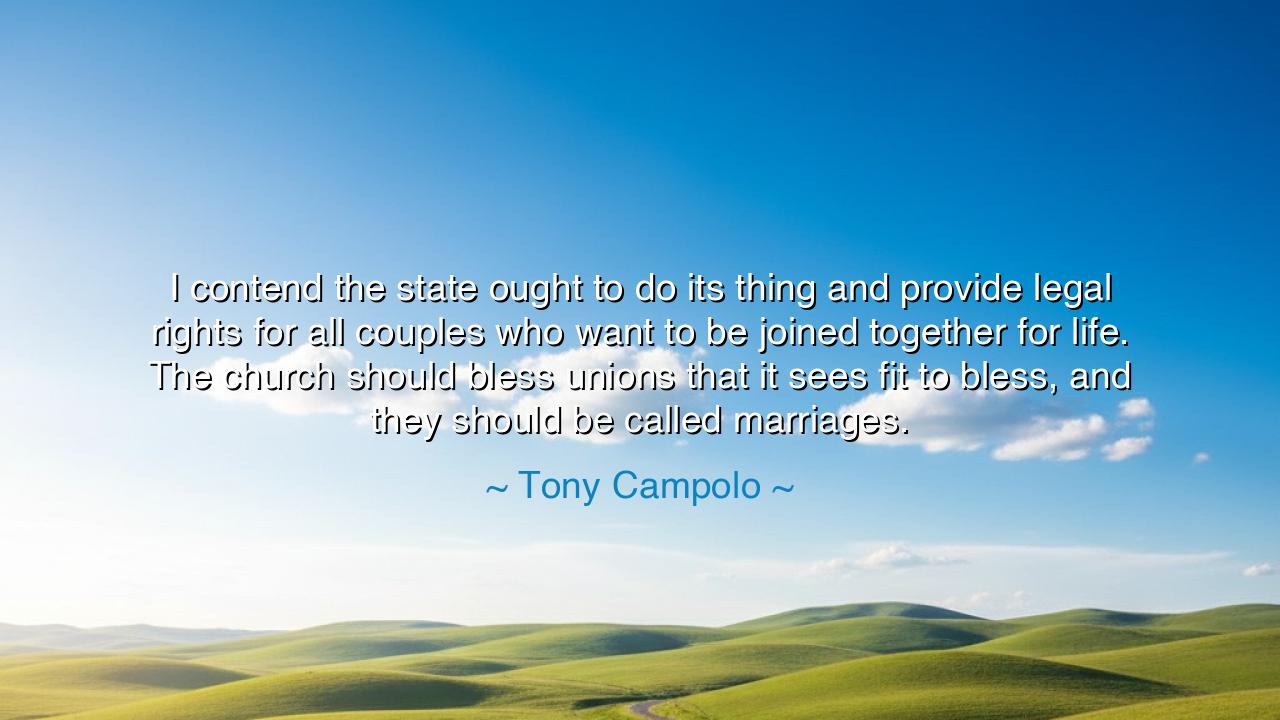
I contend the state ought to do its thing and provide legal
I contend the state ought to do its thing and provide legal rights for all couples who want to be joined together for life. The church should bless unions that it sees fit to bless, and they should be called marriages.






When Tony Campolo declared, “I contend the state ought to do its thing and provide legal rights for all couples who want to be joined together for life. The church should bless unions that it sees fit to bless, and they should be called marriages,” he was speaking as both a theologian and a prophet of balance — a man standing between the realms of law and faith, calling each to fulfill its sacred role without trespassing upon the other. His words rise from a storm that has long shaken the conscience of modern society: the struggle to reconcile civil rights with spiritual conviction, and to find harmony between the duties of the state and the authority of the church.
The origin of this quote can be traced to the early 21st century, when debates over same-sex marriage swept through courts, parliaments, and pulpits across the Western world. Campolo, a respected Christian author and sociologist, sought to bring reason and compassion to a conversation often poisoned by anger. As a man of deep faith, he revered the sanctity of marriage — but as a man of justice, he believed that legal equality must not be withheld from any who seek commitment and partnership. His proposal was not to redefine faith, but to separate its sacred duties from the mechanisms of law — to let the state provide rights, and let the church bless according to conscience.
In his words, there echoes an ancient principle that has guided wise societies through ages of turmoil: the need to distinguish between earthly governance and divine calling. Long ago, Jesus of Nazareth himself declared, “Render unto Caesar the things that are Caesar’s, and unto God the things that are God’s.” It is this wisdom that Campolo revives — the understanding that law governs the body of society, while faith governs its soul. When the two are confused, tyranny or hypocrisy often follow; but when each honors its rightful boundary, both can flourish together.
Campolo’s vision was one of reconciliation, not division. He saw the state’s role as the protector of justice — ensuring that every citizen, regardless of creed or orientation, could share in the same legal rights and responsibilities. The church’s role, on the other hand, was not to dictate law but to bless love, to discern what is holy in the eyes of its faith tradition. Thus, by separating the two, he sought to heal both. The state would guard fairness; the church would guard meaning. In this way, the union of two souls could be honored both in law and in spirit, without coercion or conflict between them.
To understand the depth of his wisdom, one might look to history. In medieval Europe, marriage was not always a sacrament of the church; it was first a civil arrangement, a binding of families and lands. Only later did the church claim its exclusive sanctity over marriage. Yet when that claim grew too rigid, human compassion was often lost — widows abandoned, lovers condemned, children illegitimate. It was only through centuries of reform that law and faith once again found equilibrium. Campolo’s words remind us that this balance must forever be renewed, for justice and mercy are not static, but living forces that must evolve as humanity grows.
His call is also a warning against arrogance, both secular and religious. When the state seeks to dictate morality, it oversteps its duty; when the church seeks to control law, it betrays the freedom of conscience that God himself bestowed. Campolo’s teaching is thus a call for humility — that each power, civil and sacred, must remember its limits. The state serves justice, not salvation; the church serves truth, not control. Only when both understand this do human beings find the peace that comes from freedom anchored in respect.
Let this, then, be the lesson for all generations: that a just society honors both the rule of law and the sanctity of belief — without forcing one upon the other. If love is genuine, let the state protect it; if faith is sincere, let it bless according to conscience. In this way, compassion and order, freedom and faith, may dwell together in harmony.
And so, Tony Campolo’s words endure as a beacon for those who would build a world where law serves equality and faith serves love. For in the end, as the ancients knew, the strength of a people lies not in uniformity of creed, but in justice guided by wisdom and mercy guided by truth.






AAdministratorAdministrator
Welcome, honored guests. Please leave a comment, we will respond soon